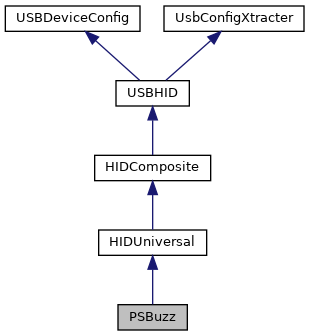#include <PSBuzz.h>


Protected Member Functions | |
| void | Reset () |
HIDUniversal implementation | |
| void | ParseHIDData (USBHID *hid, bool is_rpt_id, uint8_t len, uint8_t *buf) |
| uint8_t | OnInitSuccessful () |
USBDeviceConfig implementation | |
| virtual bool | VIDPIDOK (uint16_t vid, uint16_t pid) |
 Protected Member Functions inherited from HIDComposite Protected Member Functions inherited from HIDComposite | |
| uint16_t | GetHidClassDescrLen (uint8_t type, uint8_t num) |
| void | Initialize () |
| HIDInterface * | FindInterface (uint8_t iface, uint8_t alt, uint8_t proto) |
| void | ZeroMemory (uint8_t len, uint8_t *buf) |
| HIDReportParser * | GetReportParser (uint8_t id) |
 Protected Member Functions inherited from USBHID Protected Member Functions inherited from USBHID | |
| void | PrintEndpointDescriptor (const USB_ENDPOINT_DESCRIPTOR *ep_ptr) |
| void | PrintHidDescriptor (const USB_HID_DESCRIPTOR *pDesc) |
Additional Inherited Members | |
 Protected Attributes inherited from HIDComposite Protected Attributes inherited from HIDComposite | |
| struct HIDComposite::ReportParser | rptParsers [MAX_REPORT_PARSERS] |
| HID_CLASS_DESCRIPTOR_LEN_AND_TYPE | descrInfo [HID_MAX_HID_CLASS_DESCRIPTORS] |
| uint8_t | bConfNum |
| uint8_t | bNumIface |
| uint8_t | bNumEP |
| uint32_t | qNextPollTime |
| uint8_t | pollInterval |
| bool | bPollEnable |
| EpInfo | epInfo [totalEndpoints] |
| HIDInterface | hidInterfaces [maxHidInterfaces] |
| bool | bHasReportId |
| uint16_t | PID |
| uint16_t | VID |
 Protected Attributes inherited from USBHID Protected Attributes inherited from USBHID | |
| USB * | pUsb |
| uint8_t | bAddress |
 Static Protected Attributes inherited from HIDComposite Static Protected Attributes inherited from HIDComposite | |
| static const uint16_t | constBuffLen = 64 |
 Static Protected Attributes inherited from USBHID Static Protected Attributes inherited from USBHID | |
| static const uint8_t | epInterruptInIndex = 1 |
| static const uint8_t | epInterruptOutIndex = 2 |
| static const uint8_t | maxHidInterfaces = 5 |
| static const uint8_t | maxEpPerInterface = 2 |
| static const uint8_t | totalEndpoints = (maxHidInterfaces * maxEpPerInterface + 1) |
Detailed Description
This class implements support for the PS Buzz controllers via USB. It uses the HIDUniversal class for all the USB communication.
Constructor & Destructor Documentation
◆ PSBuzz()
|
inline |
Member Function Documentation
◆ connected()
|
inline |
◆ attachOnInit()
◆ getButtonPress()
| bool PSBuzz::getButtonPress | ( | ButtonEnum | b, |
| uint8_t | controller = 0 |
||
| ) |
getButtonPress(ButtonEnum b) will return true as long as the button is held down.
While getButtonClick(ButtonEnum b) will only return it once.
So you instance if you need to increase a variable once you would use getButtonClick(ButtonEnum b), but if you need to drive a robot forward you would use getButtonPress(ButtonEnum b).
- Parameters
-
b ButtonEnum to read. controller The controller to read from. Default to 0.
- Returns
- getButtonPress(ButtonEnum b) will return a true as long as a button is held down, while getButtonClick(ButtonEnum b) will return true once for each button press.
Definition at line 58 of file PSBuzz.cpp.
◆ getButtonClick()
| bool PSBuzz::getButtonClick | ( | ButtonEnum | b, |
| uint8_t | controller = 0 |
||
| ) |
getButtonPress(ButtonEnum b) will return true as long as the button is held down.
While getButtonClick(ButtonEnum b) will only return it once.
So you instance if you need to increase a variable once you would use getButtonClick(ButtonEnum b), but if you need to drive a robot forward you would use getButtonPress(ButtonEnum b).
- Parameters
-
b ButtonEnum to read. controller The controller to read from. Default to 0.
- Returns
- getButtonPress(ButtonEnum b) will return a true as long as a button is held down, while getButtonClick(ButtonEnum b) will return true once for each button press.
Definition at line 63 of file PSBuzz.cpp.
◆ setLedRaw()
Set LED value without using LEDEnum.
- Parameters
-
value See: LEDEnum. Set LED values directly. value Used to set whenever the LED should be on or off controller The controller to control. Defaults to 0.
Definition at line 72 of file PSBuzz.cpp.
◆ setLedOffAll()
◆ setLedOff()
◆ setLedOnAll()
◆ setLedOn()
◆ setLedToggle()
◆ ParseHIDData()
|
protectedvirtual |
Used to parse USB HID data.
- Parameters
-
hid Pointer to the HID class. is_rpt_id Only used for Hubs. len The length of the incoming data. buf Pointer to the data buffer.
Reimplemented from HIDUniversal.
Definition at line 23 of file PSBuzz.cpp.
◆ OnInitSuccessful()
|
protectedvirtual |
Called when a device is successfully initialized. Use attachOnInit(void (*funcOnInit)(void)) to call your own function. This is useful for instance if you want to set the LEDs in a specific way.
Reimplemented from HIDComposite.
Definition at line 41 of file PSBuzz.cpp.
◆ Reset()
|
inlineprotected |
◆ VIDPIDOK()
Used by the USB core to check what this driver support.
- Parameters
-
vid The device's VID. pid The device's PID.
- Returns
- Returns true if the device's VID and PID matches this driver.
Reimplemented from USBDeviceConfig.
The documentation for this class was generated from the following files: